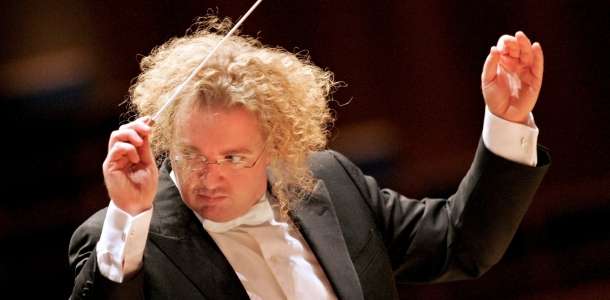|
Back
The Painter At Work New York
Isaac Stern Auditorium, Carnegie Hall
03/09/2012 -
Maurice Ravel: Suite from Ma Mère l’Oye
Igor Stravinsky: Concerto for Piano and Winds
Dmitri Shostakovich: Symphony Number 5 in D minor, Opus 47
Peter Serkin (Pianist)
Boston Symphony Orchestra, Stéphane Denève (Conductor)

S. Denève (© Stu Rosner/IMG Artists)
Okay, flagellate me: I had never heard of Stéphane Denève before last night, the third concert of the Boston Symphony Orchestra. But the French-born Music Director of orchestras in Stuttgart and Scotland, with guest appearances virtually everywhere else in Europe and America, has a burgeoning reputation. And if last night’s performance is any indication, that reputation is not unfounded.
This was Mr. Denève’s first appearance in Carnegie Hall, and he started off not with a bang, but a whisper. The start of Ravel’s Mother Goose, painted with such delicacy, such meticulous control of the instruments, that one felt he was a French painter rather than a musician.
“Control” is not always an attractive word, but this was not simply discipline. (The BSO players hardly need discipline.) Rather, he allowed that opening oboe to sing oh so softly, he allowed other instruments to enter and depart, keeping all of Ravel’s delicate virtually brass-less score to be put on an palette rather than a concert hall.
The glow of this reading was due to the smallest bits. In the Pagoda, the gong wasn’t merely struck. It was resonated, was pulled back, was struck softly again, giving the aural feeling of a Chinese pagoda. The solo violin was so sweet, and all the winds (as well as horn) played with a delicacy that perhaps only a French leader (or Swiss conductor like Dutoit) can achieve. The music was originally written as children’s piano pieces (very deft children, to be sure), and conductor Denève let every sound touch us, as if for the first time, as if we were children attuned to each scintilla of a timbre and a tone.

P. Serkin (© Kathy Chapman)
I admit to being disappointed by the Stravinsky Concerto for Winds and Piano, though this had little to do with soloist Peter Serkin or conductor Denève. But I had heard Mr. Serkin play the same work, in the more rarefied atmosphere of Zankel Hall some eight months ago, with the International Contemporary Ensemble (ICE). And that performance was inimitable.
Whether called “concerto” or not, this is written as chamber music, and the ICE-Serkin combination gave it the transparency, the pinpoint alacrity which a full almost stringless Boston Symphony Orchestra could never achieve.
Mr. Serkin, as always, gave it his all. But in the previous performance, one could hear all the Baroque-style counterpoint as well as the percussive bounce. Here, the counterpoint was lost amidst the full orchestral brunt.
After the intermission, though, Mr. Denève was at the height of his powers in that most popular of all Shostakovich symphonies. We have all heard marvelous performances of this work. (And I’m not thinking of the finale, which is failproof!) But Mr. Denève, again beginning almost imperceptibly, perhaps a little on the slow side, drove up the orchestra in a crescendo so subtle that we didn’t even realize how fervently the orchestra was playing until it was full upon us.
The Scherzo was more than sarcastic. It was cutting, ironic, it skirted on Mahler sarcasm but then cut through to become almost fearlessly mordant.
As for the Largo, Mr. Denève simply allowed the Boston Symphony strings to do their work with a sound both luscious and agonizing at one time.
Mr. Denève not only appeared for the first time at Carnegie Hall, but had never conducted the Boston Symphony before. That orchestra, though, with its long history of French conductors, played extra beautifully for him. Hopefully he will return to New York. Alan Gilbert has done wonders with our own Phil, but Mr. Denève might well show a different color, different nuances with our own ensemble.
Harry Rolnick
|